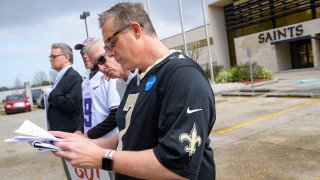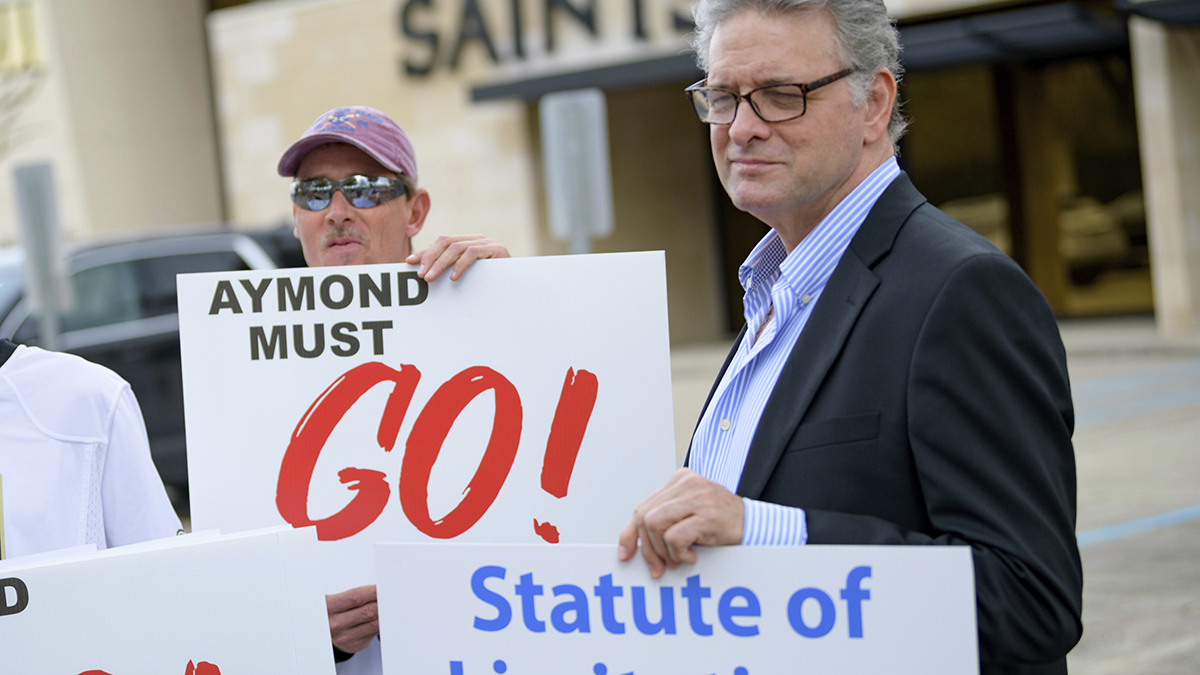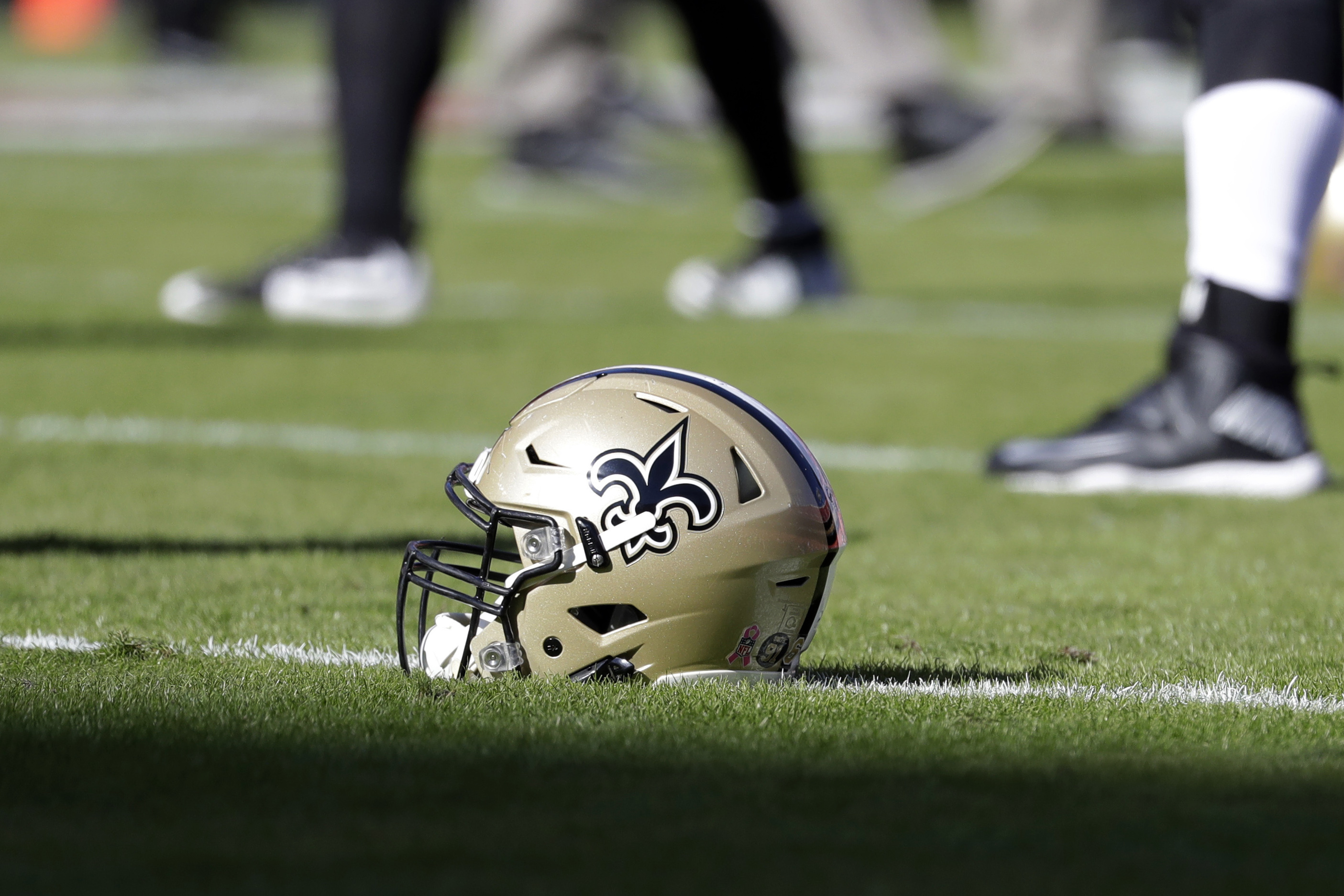
Why would an NFL team, even one called the Saints, strike a behind-the-scenes alliance with the Roman Catholic Church on an issue as emotionally fraught as clergy sex abuse?
It’s a question even die-hard Saints fans in this heavily Catholic city are asking, and the answer appears to lie in the powerful bond that the team's devoutly Catholic owner, Tom Benson, and his now-widow Gayle built for years with church leaders.
An Associated Press review of public tax documents found that the Bensons' foundation has given at least $62 million to the Archdiocese of New Orleans and other Catholic causes over the past dozen years, including gifts to schools, universities, charities and individual parishes.
Along the way, Archbishop Gregory Aymond, who knew the couple separately before they married in 2004, has become almost a part of the team, thought by some to bring the beloved Saints help from a higher power.
Get a weekly recap of the latest San Francisco Bay Area housing news. Sign up for NBC Bay Area’s Housing Deconstructed newsletter.
Aymond has been spotted on the field at Saints games and inside the team's Superdome box and has flown on the owner’s private jet. He is known for celebrating stirring pregame Masses, including one before the team’s lone Super Bowl appearance in 2010, when he correctly predicted victory and joined in a rendition of “When the Saints Go Marching In.”
The archbishop arranged a 2011 meeting of the Bensons with Pope Benedict XVI in Rome’s St. Peter's Square, where Tom Benson kissed the pontiff’s ring and flashed his own Super Bowl ring. A few years later, he served as a witness to the signing of the will that cut out Tom Benson’s estranged daughter and grandchildren and gave third wife Gayle control of a business empire that included ownership of both the Saints and the NBA’s New Orleans Pelicans.
And Aymond was there in 2018 after Tom Benson's death at age 90 to eulogize him as a “New Orleans saint on Earth” and walk side by side with Gayle in the funeral procession. In an honor typically reserved for clerics, Benson was given a two-day public visitation at Notre Dame Seminary, a chateau-style institution renovated with one of the couple’s multimillion-dollar donations.
“Our relationship with past Archbishops and the archdiocese dates back 50 years plus," Gayle Benson said in a statement this week in response to the AP's request for comment. “Our faith is the core foundation from which we live our daily lives. Unifying, helping and giving back is not something we do when asked; we do it every day. It defined how Tom Benson ran his organization and how I ardently continue his legacy.”
That bond has received renewed scrutiny after the AP reported last month that hundreds of confidential Saints emails allegedly show that some of the team’s top executives did public relations damage control for the archdiocese in the midst of its clergy abuse crisis.
It’s a controversy that has led fans in New Orleans and beyond to question what exactly the Saints did for the church and whether it was appropriate.
For now, those answers are not yet clear because the team has gone to court to block — or at least delay — the public release of those emails, which emerged as part of the discovery process in a clergy abuse lawsuit. A court hearing is scheduled next week in New Orleans to determine whether the 276 documents may be made public. The AP has filed a motion in support of their release.
Attorneys for about two dozen men bringing clergy sex claims against the church allege in court filings that the emails show the team joined in the church’s “pattern and practice of concealing its crimes.” The attorneys contend that included taking an active role in helping to shape the archdiocese’s 2018 release of its list of 57 credibly accused clergy, a roster an AP analysis found had omitted at least 20 names.
In her statement, Gayle Benson denied the Saints had any role in selecting the names, saying the team's Senior Vice President of Communications Greg Bensel was asked only to help prepare church officials for the release of the list.
“His recommendations were consistent with the Archdiocese which included: be honest, complete and transparent,” her statement said. “We are proud of the role we played and yes, in hindsight, we would help again to assist the Archdiocese in its ability to publish the list with the hope of taking this step to heal the community.”
Gayle Benson, a 73-year-old former interior designer and devout Catholic herself with a fortune estimated by Forbes at $3.1 billion, also said that neither she nor her late husband ever contributed to paying settlements or legal awards in the church's clergy abuse crisis.
“To suggest that I would offer money to the Catholic Church for anything related to the clergy molestation issue sickens me,” she wrote.
Plaintiffs' attorneys Richard Trahant and John Denenea recently subpoenaed Benson's charitable foundation for any records relating to “settlements of claims for clergy abuse” over the past decade.
“Archbishop Gregory Aymond stated that he could turn to ‘benefactors’ to help him pay sexual abuse claims," they said, referring to an interview Aymond gave last year. “We are simply following the legal process to see if he has turned to his biggest benefactor Gayle Marie Benson."
The NFL has yet to weigh in on the propriety of the Saints' actions on behalf of the church. The league has a policy barring "conduct detrimental to the integrity of and public confidence in the National Football League.”
Saints fans who have spoken out on the controversy on social media — with some even calling on Benson to sell the team — have acknowledged the complexity of an issue in a metropolitan area of 1.5 million people that is steeped in Catholic history, 36 percent Catholic and wild about its Saints.
When members of the Survivors Network of those Abused by Priests held a protest outside the Saints' suburban practice facility last month to urge the team to release the emails, some of them wore black and gold Saints jerseys and acknowledged being season ticket holders.
“The relationship between New Orleans and the Catholic Church is different from anywhere else,” said political commentator James Carville, a native Louisianan. "In New Orleans, the archbishop probably has about 80 percent name recognition. But I can understand why people outside of New Orleans might find it unusual.”
Jason Berry, a New Orleans journalist who has written several books on the Catholic Church, said the friendship between the Saints owner and the archbishop is “almost medieval in that it reflects a certain parity of church and power — in this case a professional football team that is far more powerful than local government.”
Overall, the Bensons' namesake foundation has donated nearly $100 million since 2007, helping fund a cancer center in metro New Orleans and upgrades at the stadium in Ohio where the Pro Football Hall of Fame game is played. Most of their giving has gone to Catholic organizations, AP’s review of public tax documents found.
At least $11 million has gone toward projects at the Archdiocese of New Orleans, where both Bensons were raised. In addition to Notre Dame Seminary’s renovations, the couple has supported a health and wellness program for senior citizens at a former church.
The couple has also given at least $7 million to Tom Benson's Catholic high school and at least $8 million to Loyola University in New Orleans, the Catholic school where he studied accounting.
The Bensons were major donors, too, in San Antonio, where Tom’s career in the car business broadened into banking. They donated at least $10 million to a theology school and $6 million to the Catholic university where they were married.
For their contributions to Catholic causes, the Bensons in 2012 received the highest papal honor bestowed on lay members, the Pro Ecclesia et Pontifice.
Former New Orleans Mayor Marc Morial, a Catholic who is now president of the National Urban League, said he was “horrified and dismayed” by the sexual abuse inside the archdiocese and added: "I would urge the Archdiocese and any organization that has aligned itself with the institution to adopt a policy of complete transparency, with a goal of helping victims to heal and preventing further trauma.”



